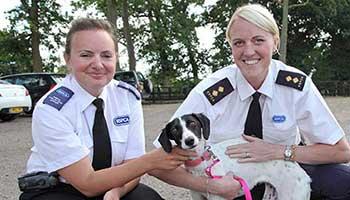Ban for couple who kept 115 rabbits in overcrowded squalor
07.04.25
A couple has been banned from keeping animals for five years after more than one hundred rabbits were found packed and living in squalor in multiple cages at their Bedfordshire home while they were on holiday.
Ian Stringer, (12/04/1954) and Katarzyna Zakolska-Stringer (27/12/1988), both of Tempest Crescent, pleaded guilty to two offences under the Animal Welfare Act 2006 and appeared at Luton Crown Court on March 21 for sentencing. As well as the disqualification they were placed under a 12-month community order which requires them to complete 140 hours of unpaid work.
RSPCA Inspector Rebecca Benson said her eyes were left stinging from the smell of urine and faeces when she entered the Stringer's home on December 30, 2023. The inspector found cages containing rabbits all across the landing, a bedroom and a living room on the first floor. Most of the rabbits were experiencing overcrowding in basic cages, some of which were stacked on top of each other.
Several of the rabbits were underweight and the inspector found a dead rabbit in one of the cages.
"The property was very warm and there was an incredibly strong smell of ammonia and my eyes started to sting once I was on the first floor - it was immediately apparent that the cages had not been cleaned for several days," said Inspector Benson in a statement to the court.
Some of the cages being used by the defendants were too small to house rabbits and would ordinarily have been used for keeping hamsters. There was also no food in any feeding bowls, which were dirty, and no hay in the cages. While some of the cages contained plastic balls and wooden chews there was little else that would have provided enrichment for the animals.
"The majority of the cages housed multiple rabbits with a few hamster cages containing single rabbits. Many of the rabbits could not stand up on their hind legs, take more than one hop or step in each direction or fully stretch when lying down," added the Inspector.
"The cage with a dead rabbit in it was filthy with no bedding and the other rabbits in the cage were sitting by the dead one as though they were cuddling up to it."
The Inspector returned to the property the following day with police rural crime officers and a vet from South Essex Wildlife Hospital, who assessed the health of each rabbit. All the pets were removed from the property in stages and taken to be cared for at private boarding establishments. Sadly, a very small number of rabbits did not recover from various ailments and later passed away, including some who required surgery.
A Code of Practice for the Welfare of Rabbits in Wales, which is viewed as best practice by the RSPCA and other animal welfare organisations, recommends a pair of average size rabbits are housed in an enclosure of at least three metres by two metres and at least one metre high to allow for a rabbit to stand fully on its hind legs.
The vet, who examined the rabbits, said: "None of the cages were fit for keeping rabbits by these recommendations, especially those cages where there was a large number of rabbits. I also don't doubt that the owner of the rabbits failed in their duty to ensure these rabbits' needs for a suitable environment were met by not providing an environment that was regularly cleaned, properly ventilated and had access to daylight."
The court was told that another pet sitter hired initially by the couple to care for the rabbits when they went on holiday ended the arrangement after 10 days. She told the defendants she was "washing her hands" of the job as it was a bigger task than they had led her to believe. The woman took the body of a dead rabbit, drenched in urine and missing an eye, to a vet.
It was said the defendants attributed blame to those they had hired to care for the rabbits, claiming "everything was fine if it was not for those rubbish rabbit sitters".
Inspector Benson added: "He (Stringer) was shocked by what had happened as he had paid a lady from a pet-sitting agency £720 to care for the rabbits. He said that he had seen the state of the cages since returning and insisted that they were not like that when he left. He said the lady that was looking after them while they were away told them that everything was fine and photos she sent him showed that the rabbits were well."
The judge made a deprivation order regarding all the rabbits, although more than 20 of them were already signed over into the care of the RSPCA. Costs of £1,500 were awarded against both defendants.
A large number of the rabbits have now been rehomed by the RSPCA, although some still remain at the charity"s animal centres and are seeking new homes.
Speaking after the sentencing, RSPCA Inspector Benson said: "This couple said they initially started with a few rabbits they had rescued and then the breeding just got out of control. The number of rabbits became too large for them to care for properly.
"There are minimum size recommendations for rabbit cages and these were all smaller than the space that is advised. There were eight or nine rabbits in some cages and regardless of the filthy conditions the size of the cages and the overcrowding in them would have caused suffering alone as the rabbits didn't have enough room to exhibit their natural behaviours.
"Anyone taking on rabbits as pets needs to do extensive research into their needs and the space they need to provide for accommodation, including access to runs, before they consider ownership."


